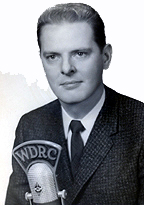| |
|
Since
1994 I've been communicating with WDRC alumnus
George Freeman. In May 2007 we talked him into an interview
about his broadcast career. - Ed Brouder, webmaster
Q:
What early influences caused you to pursue a career
in radio?
A:
A public service program produced by high school students
on WKBN in Youngstown, OH my junior year at Struthers
High School. After first writing and then broadcasting
a script on the history of the steel industry live in
a high school assembly, I was bitten by the broadcasting
bug and aggressively pursued a career in radio/TV.
Q:
Let's set the table for radio in the late 1950s. TV
was siphoning off major network talent right and left
leaving many stations without the strong, traditional
lineup of programs they were accustomed to. Many stations
turned to music as their primary product. The FCC still
required stations to do certain percentages of news
and public affairs. Which direction was your career
pointed in?
|

WDRC's
George Freeman
|
|
![August 3, 1959 - (l-r:) Richard D. Buckley, Franklin M. Doolittle, John B. Jaeger and Victor E. Forker [standing] at transfer of WDRC](people/freeman/19590803.jpg)
August
3, 1959 - (l-r:) Richard D. Buckley, Franklin
M. Doolittle, John B. Jaeger and Victor E.
Forker [standing] at transfer of WDRC.
|
A: I started
as talent on both TV and Radio; staff announcer, dj, then
moved into news as news editor, then news director. I always
had station ownership as a goal. I moved to WCCC AM/FM as
general manager. That was the final level of preparation I
needed before I took the leap and bought my first radio station.
Q:
On August 3, 1959, Buckley-Jaeger
took control of WDRC from founder Franklin M. Doolittle.
Victor E. Forker of Darien, a former WNEW account executive,
was appointed general manager. Did you know anything about
Richard Buckley or John Jaeger?
A: John
hired me as news director late in 1959. He hired my number
two news editor, Mike
Stein, and my number three man, Bud
Steele. None of us had met prior to joining WDRC.
Jaeger had a very successful career hiring talent at WNEW-AM,
New York. John was a very likable fellow. He had a terrific
wit which seemed to surface when he got a few drinks in him.
I visited him in Boca Raton, FL in the mid-70s. He and Dick
Buckley formed their partnership after being edged out by
John Kluge when Kluge took control of WNEW AM/TV. Buck Forker
was smooth, suave and likable.
Q:
In late 1959 you were working in Binghamton, NY. What was
your job and what led to your hiring at WDRC?
|
A: I had been
news director of WNBF-TV 12 and WNBF-AM. My boss, the general manager
of Triangle's New Haven operation, WNHC, got the job as Triangle's
general manager of WNBF-TV/AM/FM. He asked me to go with him to
be news director of the Binghamton group. An intern I was training
slandered the town clerk of Owego, NY in a news story he created
moments before I read his version on the eleven pm newscast. On
a Saturday night we had a captive audience of a million viewers.
The intern and I were terminated so that when the town clerk's lawyer
called Triangle, management could say we were "no longer with
the firm. Addresses unknown". I immediately bought an ad in
Broadcasting Magazine in "Situations Wanted". John Jaeger was one
who responded. I flew to Long Island for an interview and was hired.
Q:
Describe Hartford's competitive marketplace when you arrived.
A: WDRC
was still riding the CBS Radio Network as the station had done for
some 25 years. The music we played was MOR (middle of the road).
News was pretty much "rip and read" from the wire service. Leif
Jensen read the newscasts. What a great pair of pipes! Russ
Naughton was another pre-Buckley/Jaeger WDRC personality.
WTIC owned
the market. Bob Steele at one time had the largest share of audience
compared to those of any other morning man in America. His show
was continually sold out. Advertisers lined up waiting to get on
during his time period, 6-10AM. Bob had ingredients such as a "Word
of The Day" and readings such as an English dialect piece about
a child with "a stick with a horse's head on it." WTIC's
50 kw power at 1080 made it the technically superior facility. WDRC's
5kw at the higher dial position of 1360 rendered us inferior technically.
Steele got fan mail from towns and cities where our signal could
not be heard.
|
|



![August 3, 1959 - (l-r:) Richard D. Buckley, Franklin M. Doolittle, John B. Jaeger and Victor E. Forker [standing] at transfer of WDRC](people/freeman/19590803.jpg)